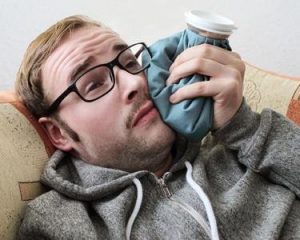 Emergencies happen when they happen. There’s no telling when or to whom. Cedar View Dental knows this and is ready to help you when those emergencies do crop up.
Emergencies happen when they happen. There’s no telling when or to whom. Cedar View Dental knows this and is ready to help you when those emergencies do crop up.
Emergency Dentistry First Aid
Dental emergencies can be stressful. To help mitigate that, here are some first aid practices that you can use to deal with several different types of emergency. Follow these for the time in between the emergency and your dental appointment.
Broken or Chipped Tooth | If you have a severe chip or deep crack, you will first want to collect any missing pieces. If at all possible, try to replace those pieces with some sort of temporary adhesive. Toothpaste can be an option here.
If the replacement is not possible, do what you can to keep the possibly-jagged edges of the broken tooth from damaging the soft tissues of your mouth. Then give us a call.
Damaged Dental Restorations | A small crack will not risk the health of your teeth in the time it takes to come in for repairs. However, if the damage is severe — especially to a dental crown — you will still want to call us right away. The longer the soft insides of the tooth are exposed to the elements, the higher the chance of infection.
Just as with a broken tooth, make sure that any sharp edges are covered, to avoid further damage.
Missing Tooth | If your tooth has been knocked out, follow these steps:
- First, gently rinse the tooth.
- Only touch it by the crown — never by the root.
- If it is possible, place the tooth back into its socket.
- If not, store it in either milk or clean, filtered water.
- Then call us promptly.
 The faster we can treat a missing tooth, the better chance we have of successfully restoring it. Do the same with teeth that have been loosened. Leave them in the socket, keep the area clean, and call us right away.
The faster we can treat a missing tooth, the better chance we have of successfully restoring it. Do the same with teeth that have been loosened. Leave them in the socket, keep the area clean, and call us right away.
Severe Tooth Pain | Severe pain is still a dental emergency. Take a painkiller if needed, and don’t hesitate to call us.
Whether this pain is caused by a root canal infection, a cavity, or gum disease, a professional cleaning can help the area begin the healing process. Treatment can also involve fillings, dental crowns, gum disease treatment, and root canal procedures.
Not only will these procedures immediately treat your pain, but they can also prevent further infection, decay, and tooth loss.
Jaw or Joint Pain | Dental health includes treatment of the jaw and the temporomandibular joint. If you have been injured in one of these areas, check in with a physician or EMT before you do anything else. After any other injuries or health issues are taken care of, we can make a treatment plan with you for healing the TMJ.
Learn more on our TMJ page.
Our Emergency Dental Policy
First and foremost, we aim to get you healed. In any dental emergency, we will see you first, make an assessment, and work out a treatment plan from there. If you are worried about an accident or injury, give us a call. We’ll walk you through everything you need to know and do.